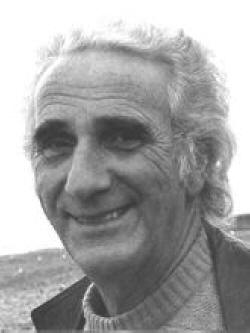

Queer Places:
Second Ave, Hove BN3 2LL, UK
 Edward Thompson (April 5, 1917 - September 7, 2001) was a publisher and the director of Heinemann Educational Books (HEB) from the 1950s to the 1980s. In 1982 he retired from HEB. He supported Brighton's lesbian and gay helplines and agencies.
Edward Thompson (April 5, 1917 - September 7, 2001) was a publisher and the director of Heinemann Educational Books (HEB) from the 1950s to the 1980s. In 1982 he retired from HEB. He supported Brighton's lesbian and gay helplines and agencies.
Born in Surrey, he was educated at Sutton grammar school. A lifelong pacifist, he worked on the land through most of the war, and in 1945 joined Heinemann. Soon afterwards his career took off when, as assistant to Alan Hill, HEB's director, he was given what he regarded as the happy job of creating its drama list.
"Nothing much happens to a boy before his first play!" he once wrote. This observation was prompted by his first visit to the theatre, aged 12, to see Romeo And Juliet at Stratford-upon-Avon. He had a driving passion for theatre, which spilled over into every corner of his life. Never one to aim low, he secured John Gielgud, Michael Redgrave and Michel Saint-Denis among his first authors.
Through the 1960s and 1970s, the HEB drama list broadened its scope, which gave him the opportunity to look out for promising writers in theatres all over the country. Perhaps his happiest discovery was Robert Bolt; Edward saw a performance of Flowering Cherry, his first major work, and immediately arranged for publication. His confidence was amply repaid when HEB published the million-selling A Man For All Seasons.
Another HEB coup was its appointment as publishers to the National Theatre in 1976. Edward also published books by Gielgud on his work in the theatre, and this working partnership formed the basis of a warm friendship.
Perhaps the most far-reaching influence on his life, certainly in his formative years, was that of Elsie Green, creator of the Shakespeare tradition at the Polesden Lacey open-air theatre in Surrey. Her career started at the Tavistock Little Theatre, where one of her first productions was The Ascent Of F6 by WH Auden and Christopher Isherwood. Edward joined her there as a very young man during the war. Their friendship lasted until her death in 1997.
In the early 1970s, Edward settled in Hove, largely, as he said, because of the Brighton Festival, which was soon to take off and with which he became closely associated. As a participant, he gave talks on the theatre and on the actors he had come to number among his friends. He retired from HEB in 1982. His attractive and spacious flat in Second Avenue, Hove, filled with thousands of books, sculptures and pictures, became a haven for anyone interested in writing or the theatre. Early on he joined organisations such as the (then flourishing) Brighton Campaign for Homosexual Equality (CHE), and later the Gay Community Organisation. Through these organisations he rapidly turned himself into a kind of impresario for Brighton's gay culture.
Edward's shining quality lay in his desire to share his passionate love of the theatre and books, and his hospitality. His book-lined flat in Hove became the focal point of his life, and he maintained what was virtually open house until he became incapacitated. There were parties and lunches, for visiting companies to Brighton's Theatre Royal, and for young people struggling to become writers, whose work he staged for invited audiences in his flat.
He was also involved with Brighton's gay community, not as an activist but as an enthusiastic supporter of the many lesbian and gay helplines and agencies which flourish there.
My published books: